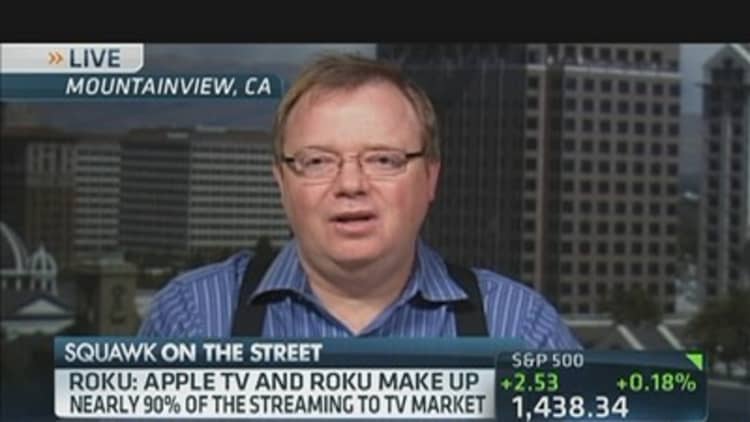
Most television will be streamed over the Internet in the coming years, said Anthony Wood, CEO of Roku, maker of the streaming TV device of the same name.
The question is how Internet-delivered content will get to your TV and who will deliver it, Wood told CNBC's Squawk on the Street. Right now, set-top devices like Roku and Apple TV and Internet-enabled Smart TVs are best positioned to take advantage of the sea change, said Wood.
"Those are the two ways that most people are going to be watching television that's distributed over the Internet," said Wood.
In the set-top battle, Roku and Apple are neck and neck right now. The two devices account for roughly 90 percent of the stream-to-television market. As of April, Roku had sold about 3 million Roku players since the company was founded in 2002. The rest of 2012 has been positive, said Wood.
"We were selling a Roku every second on Black Friday. We're having our best quarter ever this year, and the platform is doing really well," he said.
Stream-to-television devices currently have an advantage over Smart TVs, said Wood. Whereas most Smart TVs deliver a few marquee services, such as Netflix and Hulu, Roku gives customers access to nearly 700 streaming channels, according to the company.
However, the lines between Roku and its Smart TV competition could begin to blur. A number of Roku-ready televisions will debut at CES, the preeminent technology trade show, this January.
"We think there's a huge opportunity to expand our platform from streaming players, where we're a leader today, into TVs," said Wood.
While Wood believes that the future of television is on the Internet, he said it will be some time before consumers give up the bundled services offered by cable and satellite providers. But as these the incumbents face competition from streaming services, he said they may begin to offer more options and cheaper services.
The next generation, he says, is a virtual MSO, or multiple system operator. Such a system would combine on-demand services such as Netflix and Hulu with traditional subscription fee service for programmed TV — all via the Internet, rather than cable or satellite.
"That's the big question. I think that's coming, but whether it's next year or not we'll have to see," said Wood.

